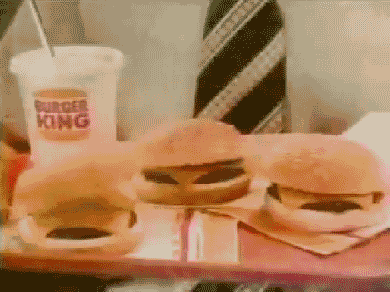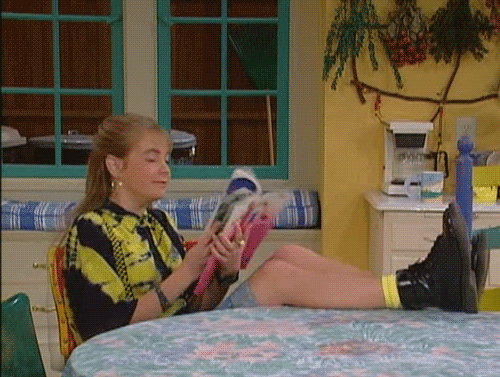
Before I start this post I guess I better clarify that I work in a basement office with glass walls, cheap carpeting, very little sunlight, and even less people. There is a drinks machine directly outside that occasionally spits out sour, tepid coffee (not a day goes by that I don’t wish it was gin) and an angry-looking cleaner who half-heartedly vacuums the floor and always managed to catch the back of my heels when I walk past. This job isn’t due to choice (not in the way we usually define it, anyway) but rather a lack of money, lack of direction, and lack of any tangible skill or talent. It is definitely, completely, one hundred percent a ‘McJob’ as defined by Douglas Coupland in the seminal 20-something life-angst handbook, Generation X.
A McJob just about covers bills and the occasional cheap bottle of moonshine, but is ultimately menial, dull, undesirable, and unsatisfying. In Coupland’s book, which focuses on three friends who have come of age during the ‘baby boomer’ era and the subsequent downfall of this area, scenes of the characters either working or drinking or complaining about their McJobs are contrasted against short ‘end of the world’ type scenarios in which love and sex and death are all discussed in uncomfortably close proximity. To me, these scenes of disaster and destruction (and perverse excitement! after all, who hasn’t had fantasies concerning the ultimate demise of the only world they know?) further the contrast between the dull, repetitive, conveyer-belt feeling of working at a McJob and the secret longing we all have of desperately wanting to be taken away from a life that doesn’t change. At its core, Coupland’s novel focuses on the most basic human connection, that one thing we have in common- the idea that we’re all waiting for the future to happen, and that if something destroys us or if the world ends before the future comes along, then at least we are not to blame for the shitheaps that our lives are/were. Our shitty McJobs and 20-something graduate pipe dreams that will remain pipe dreams and our inability to ditch the former for the latter can therefore not be given the terrifying description of being a choice, a conscious decision. Or, worse of all, the word that strikes fear into the heart of every 20-something: a 'lifestyle'.
If something invariably out of our control changes our lives in an unexpected way, then it cannot be our fault that the future we longed for never arrived. It’s the same as dying young, in some kind of horrible accident – instead of being pathetic, you’re an inspiration. Instead of being lazy or scared, you’re tragic. A huge, definable event happened to you that took away your choice and that makes sense to us – it is a solid excuse, a reason, unlike the small, indefinable things that ruin us every day.
Because (and this will make me sound even more perverse than before, I don’t doubt it, and I’m really sorry you guys), I'm certain that the majority of people with McJobs wake up some days praying for disaster. A freak accident involving the photocopier. a sinkhole that opens directly underneath the Burger King. Sometimes, when I'm sitting at my desk and inputting data into my 50th mortgage application of the day, I find myself thinking about what I would do in all of these strange, unexpected scenarios. It's easy to completely live in your own head when you're working a McJob and while I'm more than happy to do this, a lot of people aren't. And here, due to this ultimate basic human need for contact, for connection, I present to you something that I like to call McCulture.

McCulture, to me, is something born out of offices and staff rooms and stock cupboards and McJobs. McCulture is the kind of thing discussed over cheap coffee on monday mornings, during cigarette breaks, on the shared bus journey home with an almost-stranger. McCulture is what society usually deems to be 'low' culture - it's the x factor on saturday nights, it's Take A Break instead of The Times, it's fast food and the top 40 and anything that is cheap and easily accessible to the mainstream. It appeals to the majority and this is why it cultivates and survives so well in McJobs.
The idea of McCulture and its importance in the workplace first because apparent to me a few fridays ago when I was discussing the weekend with a colleague (yeah, that old stereotype). I said that I would mostly be doing the usual, which in my life seems to consist of drinking too much gin, napping a lot during the day, and eating jalapeno sandwiches. However, I added that this weekend I would be deviating from this slightly - I would be watching the X Factor on Saturday! Before my colleague could reply, another one turned to me, almost flabbergasted, and said "Why the fuck would you want to do that?"
Maybe it's important to go slightly backwards at this point. The idea of McCulture and its importance in general first became apparent to me when I was fifteen years old. I was sitting in my year 11 Religious Studies class, the only class I attended religiously (hah!) and cared much about. We were discussing ethics, the general concept of what is 'good' and what is 'bad', and my teacher opened up a pre-made powerpoint display on the projector. It featured two men, old looking, with funny wigs and extravagant clothes. One was stern and hard-faced, the other plumper and almost smiling. Perhaps there is some truth to the idea that what people believe on the inside influences how they appear on the outside (this life lesson courtesy of The Twits', thx Roald Dahl) because the first guy, the hard-faced dude, is named John Stuart Mill and next to his picture, my teacher had listed the quote "Better to be Socrates dissatisfied than a pig satisfied". I could picture John Stuart Mill saying this, and I didn't doubt that he meant it at all (the term 'pig' teamed with his facial expression seemed exceptionally grim and awful to me). Next to Bentham, however, were the words, "Pushpin is as good as poetry."
I'm gonna try and simplify this now, in order to explain it to you guys and also to prove to myself that I still have some basic philosophical knowledge in my brain that hasn't been punched out by alcohol.
When Mill stated that it is better to be Socrates dissatisfied than a pig satisfied, he was obviously referring to the philosopher Socrates, well-known for his admonition that "I only know that I know nothing". By saying that he would rather be Socrates dissatisfied than a pig satisfied, Mill is saying that he would rather be constantly striving for intelligence and answers that would lead him to being unhappy or unsettled with his life, than to take pleasure in simpler things and be happy. Basically, he fancied up the phrase that "ignorance is bliss" a whole lot, which makes sense when you consider that his opinion is based on his own idea that some pleasures (aka the intelligent ones) and hobbies are more beneficial and 'good' than other, simpler ones.
Bentham, however, believed wholeheartedly that pushpin really was as good as poetry. By this, he meant that one should not differentiate between 'intellectual' and simpler pleasures, and should not place higher importance on those that are intellectual rather than simple. Bentham was my kinda guy, really - he believed that as long as a pleasure wasn't harming someone, then it didn't matter whether it lead to intellectual gain or just provided fun. Basically, Bentham defined McCulture.
A lot of people seem to agree with the Mill version of culture, though - the idea that the only culture that is valid or marks you as a worthy member of society is one that is intellectually driven. To accept this as right, and to believe that some people hold more weight than others due to their interests being of a 'higher' culture, is extremely problematic to me. Without getting too school-sociology-textbook on you, it assumes that everyone has the same access to intellectual and simple materials - that someone who reads Take A Break will have had the same education and upbringing as someone who reads The Times. That someone who watches the X Factor does so because they are lazy and incapable of absorbing anything more intellectual. To say that the only valid culture is that of fine food and not junk food, good wine and not cheap beer, literature and not teen fiction, 'real' tv and not reality tv, is to deny that culture is more than just a choice. That it's more than just deciding to read a magazine because it's easier than a novel. That it's not a matter of class and money and access and privilege and all of those other buzzwords, but personal choice. And that's bullshit.
I don't mean to suggest that i'm against intellectual culture - I like books more than people and I appreciate a good documentary from time to time. I just don't think that it should be seen as better than McCulture, just because McCulture is more accessible - a culture that is directed towards every class rather than those who can just afford it.
So, to the dude who asked me why the fuck I'd want to subject myself to the x factor on a Saturday night, I say - why not? Pushpin is as good as poetry, after all, and I'm gonna make sure that I enjoy both. This weekend I'll be watching the X Factor with a bottle of Gordon's finest gin resting in my lap. I'll be eating pizza and reading John Fowles. I'm not trying to prove how much of a special snowflake I am, how much of a contradiction - because these cultures, these higher and lower pleasures, should not be contradictory in the first place. It all comes down to the basic principle of 'Do what you love and fuck the rest' - a modernisation of Bentham's philosophy, in my opinion. Eat junk food. Drink fine wine. Watch the Cartoon Network. Watch the Geography Channel. Read gossip magazines. Read poetry. And always, always, play pushpin.

